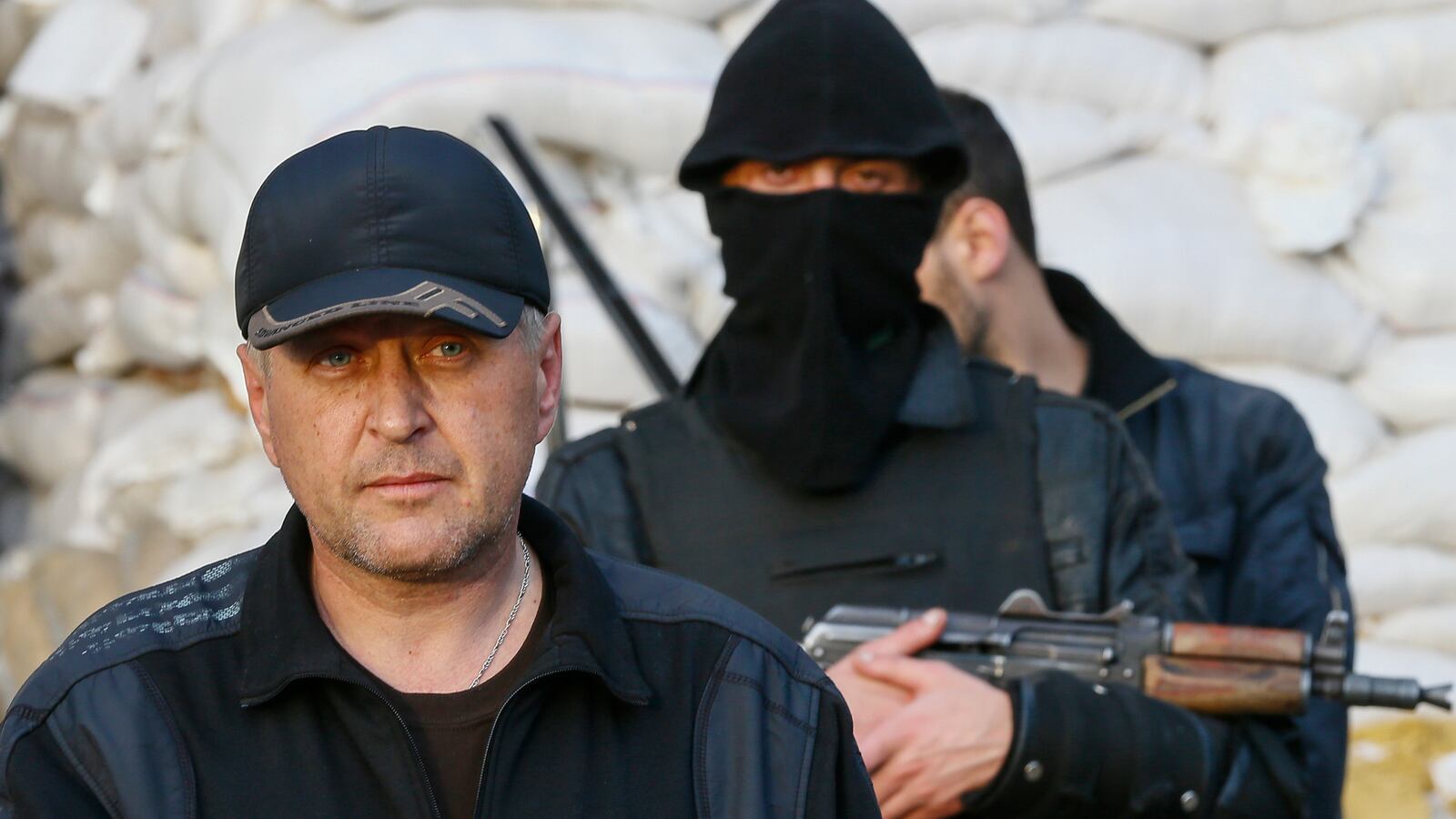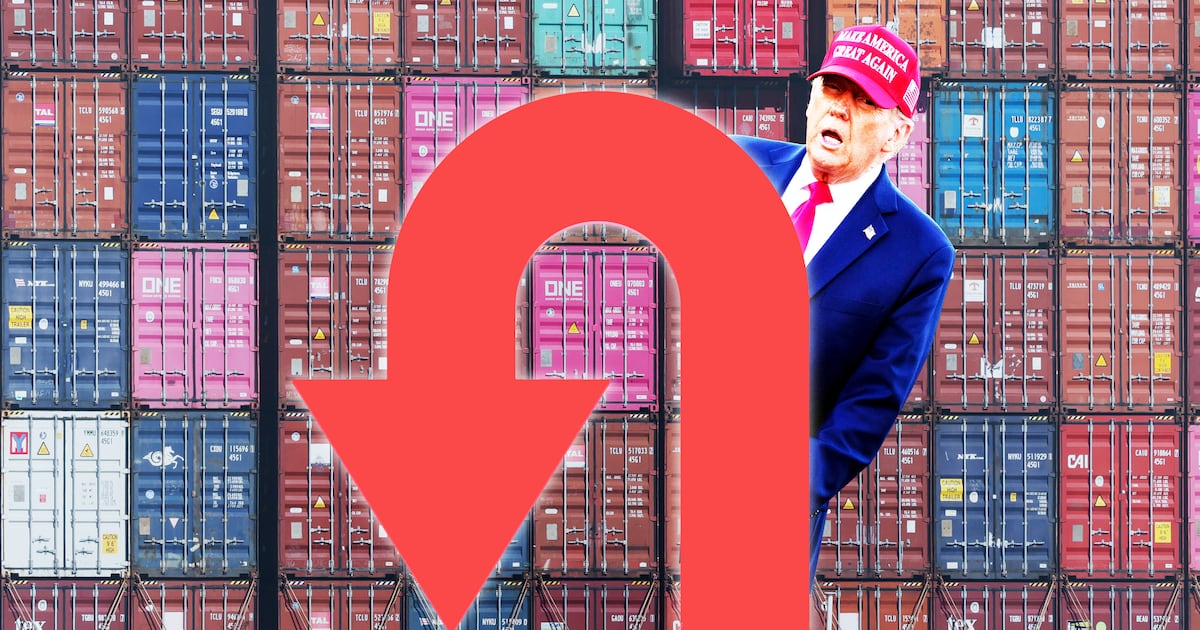SLOVYANSK, Ukraine—When he threw his head back, shaking it in disbelief that such a question could be asked, the real menace of the former Soviet military officer came through. One of his gold teeth glinted in the light as he sneered. Why was he holding a pro-Ukrainian woman activist? She who had been led blindfolded into detention on Sunday evening.

“I have information she is a spy,” said Vyacheslav Ponomaryov, the pro-Russian militant leader in Slovyansk, a rust-belt industrial town on a tributary of the Donets River an hour’s drive from the Russian border.
The pro-Ukrainian activist, who had taken part in the February protests in Kiev that led to the ouster of Russia-friendly President Viktor Yanukovych, is among seven others, including a charity worker, currently being detained in Slovyansk by Ponomaryov and his masked gunmen. They now rule not only the government buildings they seized on April 13 but hold sway across the entire town of 129,000, patrolling its streets and overseeing the club-wielding locals who man checkpoints circling the town and block strategic junctions.
Following a gun-battle Sunday in which at least three pro-Russian militants died, separatist leaders in eastern Ukraine appear even more contemptuous of the government in Kiev and determined to maintain their occupation of government buildings in several cities across eastern Ukraine. The mood here has turned darker, even more sinister, and separatist leaders in their various bailiwicks across the oblasts of the east are preparing for a showdown with Ukraine’s interim leaders, who, they argue, are fascists and neo-Nazis out to deprive ethnic Russians of their minority rights and intent on banning their language.
Sunday’s shooting incident, which pro-Russian militants insist was carried out by Ukrainian ultranationalists from the shadowy Right Sector group, has made matters much worse, prompting claims by Kiev politicians that the gunfight at a separatist checkpoint on a country lane on the outskirts of Slovyansk was stage-managed by the Russians to foment more unrest and whip up more anti-Kiev sentiments.
While there is no evidence that the incident was staged—three locals were killed including a 24-year-old father of six kids and the 42-year-old father of an eight-month old baby—it came at an inopportune time for the Organization for Security and Cooperation in Europe, which started at the weekend trying to implement last week’s Geneva accord aimed at resolving the Ukraine crisis.
The pro-Russian militancy now has more martyrs to add to the three separatists killed overnight on April 17 in Mariupol on the Sea of Avov during an assault on a National Guard base. And their deaths have heightened the tensions and the sense of foreboding that something bigger and more brutal may happen soon.
In the region’s largest city, Donetsk, an hour’s drive from Slovyansk, Vladimir Makovich, the speaker of the presidium of the militants’ Donetsk Republic, says: “We expect an attack at any time from those bastards in Kiev.” Stroking his long beard, and struggling with wheezy coughing fits, Makovich adds, “We won’t leave the government buildings we have until the government in Kiev resigns.”
Appeals from Kiev politicians for dialogue along with promises of decentralization and assurances that the Russian language is safe are falling on deaf ears and there are no signs of compromise or any softening on the part of the pro-Russian militants.
In the imposing 11-floor regional government building in Donetsk, the separatists are busy preparing for an attack they believe will be mounted this week by Ukrainian authorities. Supplies are being brought in, fortifications and barricades inside the building are being reinforced and there are instructions posted in the stairwells about what steps to take if the Ukrainian military attempt to storm the building—an operation that could only be carried out successfully with serious blood-letting. The militants are well armed and many of them appear disciplined and military in their bearing.
Among the counter-assault procedures to be followed: using heavy lights to blind any attackers, taking down various Russian, Cossack and Donetsk flags the militants are flying from the building so wind-direction is less clear and placing mannequins dressed in combat fatigues in the windows and throughout the building to present false targets for commandos and snipers. Steel doors inside the building that were installed a few months ago by the Yanukovych regime are to be shut. Each floor is responsible for its own defense.
As the militants in Donetsk and across the east ready for a showdown they are becoming also rougher with foreigners and outsiders and more suspicious, seeing spies, neo-Nazis and U.S. mercenaries everywhere.
Separatist barricades in Slovyansk sport hand-written signs declaring, “STOP NATO”, “NO TO US AND EUROPE” and, in reference to an American security firm that Moscow propagandists regularly claim is active in Ukraine, “WE ARE KILLED BY GREYSTONE.”
On Monday a Belarusian and two Italian journalists in Slovyansk were held and questioned for several hours for what pro-Russian militants say was a “document check.”
In an hour-long press conference with Ponomaryov, Slovyansk’s self-declared mayor, reporters were harangued and threatened with retribution if they fail to report the “truth” as far as the militants see it. “We know who you are; we have taken your names so we can follow who reports the truth and who doesn’t,” announced Vera Kuprichenko, a stout, unsmiling middle-aged woman introduced as a town councilor.
Later she demanded donations from the 50 or so reporters assembled in the local municipal chamber and denounced those who wouldn’t contribute (The Daily Beast among them) for being “fascists.” Reporters from Russian media outlets such as Life News contributed without complaint, and Kuprichenko, still with her sour expression firmly fixed, announced subsequently that 900 hryvnia ($80) had been raised for the cause. But what cause?
A small, armed opposition to the interim government in Kiev has for weeks been manipulating political developments in eastern Ukraine. Kiev politicians insist the pro-Russian militants have support from the Kremlin and that Russian intelligence operatives are coaching, arming and funding the unrest. Recent opinion polls suggest that only about a third of locals in the east are pro-Russian—although large majorities are opposed to the post-Yanukovych interim government in Kiev, too.
Opinions among the pro-Russian militants differ as well about what they want: whether the mostly Russian-speaking east of Ukraine should be annexed by Russia like the Black Sea peninsula of Crimea or whether it should become an autonomous republic. Ponomaryov says he favors the latter but after the shooting on Sunday he has appealed to Russia’s President Vladimir Putin for protection and weapons. He denies he gets any help now or that Russian troops are already in the east operating clandestinely, insisting: “We have our own people. I am a former soldier and I asked my friends who served with me to help and they have come from Russia, Belarus and Kazakhstan. They are helping to train volunteers.”
He seems, though, to have a lot of friends. Slovyansk brings home the challenge the unrest poses for Ukraine’s struggling government. To reassert control here, unlike in Donetsk, won’t just be a matter of storming a couple of government buildings: it could involve a town-wide fight here and in the slightly larger neighboring town of Kramatorsk, where pro-Russian militants also are well dug in. The danger is that such bloodletting could well prompt more locals to join the militants—or provide the pretext for Putin to send in the tanks.
The pro-Russian activists, though, would likely see inaction by Kiev as weakness, an invitation to consolidate their hold in the towns they control now, and encouragement to target others in the east.
Two hours before meeting with journalists late Monday in Slovyansk’s municipal administration building, which he seized along with well-armed gunmen on April 13, the clean-shaven Ponomaryov met with the deputy mission chief of the Organization for Security and Cooperation in Europe, a soft-spoken British diplomat called Mark Etherington. “We got acquainted,” Ponomaryov says curtly. Dismissive of the diplomatic machinations to resolve the crisis, Ponomaryov said afterward, “We will decide here what to do, and not diplomats in Geneva.”
Meanwhile the woman we asked about is still being held. Her name is Irma Krat, she is 29, and the secessionists say she is a member of an ultranationalist group called the Patriots of Ukraine. The pro-Russian partisans accuse her of abusing what were then the pro-Russian Ukrainian riot police and a Russian journalist in February. On Sunday evening reporters from a Russian website were allowed to see her—an encounter they presented in a way highly sympathetic to the separatists. On Monday night another group of journalists was allowed to interview her. “I have done nothing wrong,” she said.





